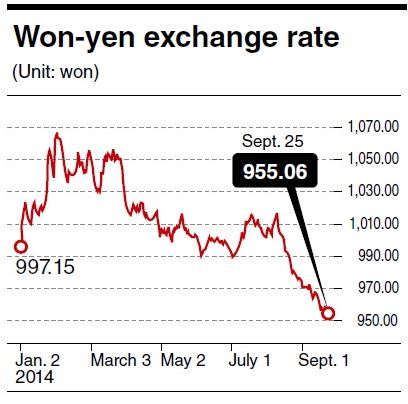The won-yen exchange rate is likely to drop to the 800 won level in the third quarter of next year as Japan is expected to continue quantitative easing to boost its economy, according to global financial companies like JP Morgan and Citibank.
French bank BNP Paribas projected the bleakest outlook, claiming that the rate could nosedive to 700 won per 100 yen next year.
The rate dropped below 960 won (92 cents) this month, the lowest since Aug. 2008, when it posted 954 won.

“The weaker yen may undercut price competitiveness of Korean goods in overseas markets by making them relatively more expensive than the products of their Japanese rivals,” industry watchers said.
Industries likely to be hurt by a stronger won include tech, steel, auto and oil-related businesses.
As a case in point, in the auto industry, operating profits of Hyundai Motor and Kia Motors, whose car exports account for 80 percent of total sales, saw a 13-32 percent drop in the second quarter, compared to a year earlier.
Meanwhile, Japan’s big three companies including Toyota saw their business profits rise by 4-13 percent during the same period.
Small exporters will be dampened the most by the strong won. According to Industrial Bank of Korea, loans of small and medium enterprises stood at 75 billion won in the second quarter, a 92 percent increase from 39 billion won from the previous quarter as they are having financial difficulties due to currency fluctuations.
If the trend continues, the Bank of Korea will be pressed to further lower the key interest rate in a bid to help local exporters hit by the strong won. Some experts said that fiscal policy can lessen the effects of the weak yen.
“The time is ripe for the government to take into account the fluctuation of won-yen rate,” said Yun Chang-hyun, head of the Korea Institute of Finance.
Lee Ju-yeol, governor of the Bank of Korea also hinted a possible rate cut at a recent policy seminar. “If Japan continues quantitative easing, the won will strengthen against the yen, further hampering Korea’s export competitiveness,” he said.
Finance Minister Choi Kyung-hwan raised similar concerns last week during the Group of 20 meetings in Australia.
Market watchers say the biggest worry is that the government may not have the effective tools to stave off the impact of the falling yen.
“The won-yen exchange rate is an arbitrary rate. There isn’t much that we can do,” Choi said in Australia.
By Shin Ji-hye (shinjh@heraldcorp.com)
French bank BNP Paribas projected the bleakest outlook, claiming that the rate could nosedive to 700 won per 100 yen next year.
The rate dropped below 960 won (92 cents) this month, the lowest since Aug. 2008, when it posted 954 won.

“The weaker yen may undercut price competitiveness of Korean goods in overseas markets by making them relatively more expensive than the products of their Japanese rivals,” industry watchers said.
Industries likely to be hurt by a stronger won include tech, steel, auto and oil-related businesses.
As a case in point, in the auto industry, operating profits of Hyundai Motor and Kia Motors, whose car exports account for 80 percent of total sales, saw a 13-32 percent drop in the second quarter, compared to a year earlier.
Meanwhile, Japan’s big three companies including Toyota saw their business profits rise by 4-13 percent during the same period.
Small exporters will be dampened the most by the strong won. According to Industrial Bank of Korea, loans of small and medium enterprises stood at 75 billion won in the second quarter, a 92 percent increase from 39 billion won from the previous quarter as they are having financial difficulties due to currency fluctuations.
If the trend continues, the Bank of Korea will be pressed to further lower the key interest rate in a bid to help local exporters hit by the strong won. Some experts said that fiscal policy can lessen the effects of the weak yen.
“The time is ripe for the government to take into account the fluctuation of won-yen rate,” said Yun Chang-hyun, head of the Korea Institute of Finance.
Lee Ju-yeol, governor of the Bank of Korea also hinted a possible rate cut at a recent policy seminar. “If Japan continues quantitative easing, the won will strengthen against the yen, further hampering Korea’s export competitiveness,” he said.
Finance Minister Choi Kyung-hwan raised similar concerns last week during the Group of 20 meetings in Australia.
Market watchers say the biggest worry is that the government may not have the effective tools to stave off the impact of the falling yen.
“The won-yen exchange rate is an arbitrary rate. There isn’t much that we can do,” Choi said in Australia.
By Shin Ji-hye (shinjh@heraldcorp.com)



![[Exclusive] Korean military set to ban iPhones over 'security' concerns](http://res.heraldm.com/phpwas/restmb_idxmake.php?idx=644&simg=/content/image/2024/04/23/20240423050599_0.jpg&u=20240423183955)




![[Pressure points] Leggings in public: Fashion statement or social faux pas?](http://res.heraldm.com/phpwas/restmb_idxmake.php?idx=644&simg=/content/image/2024/04/23/20240423050669_0.jpg&u=)











